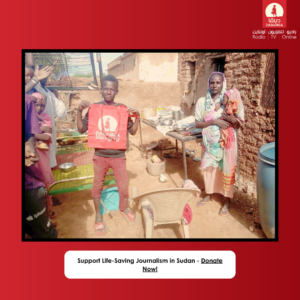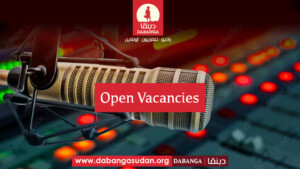Makers of Dabanga: The story of Kamal Elsadig
A number of experienced journalists make the daily news broadcasts of Radio Dabanga possible. Today we are asking Kamal Yousif, Editor-in-Chief, to tell his story. He coordinates the team of professionals in Amsterdam, making sure that reliable news is reported from all corners of Sudan.
 Kamal Yousif Elsadig, Editor-in-Chief of Radio Dabanga. Depicted images in the back are made by photographer Jan-Joseph Stok. (RD)
Kamal Yousif Elsadig, Editor-in-Chief of Radio Dabanga. Depicted images in the back are made by photographer Jan-Joseph Stok. (RD)
A number of experienced journalists make the daily news broadcasts of Radio Dabanga possible. Today we are asking Kamal Yousif Elsadig, Editor-in-Chief, to tell his story. He coordinates the team of professionals in Amsterdam, making sure that reliable news is reported from all corners of Sudan.
“Radio Dabanga is a dream come true to me. Since I was very young, I knew I wanted to be a journalist.
It wasn’t an easy path as a Darfuri, but over time, I succeeded in becoming an editor of El Ayam, a respected progressive newspaper in Sudan.
The security service banned the newspaper for publishing my article on human rights abuses in Darfur.

I was one of the first journalists to write about the human rights abuses in Darfur. The publisher of my newspaper was soon summoned by the security services. The message was clear: the regime did not want to see any more articles by me, but the newspaper stood behind me, and had to pay for that with a banning order.
We were not allowed to talk about the conflict in Darfur. That made me very sad, but also defiant. I wanted to give people the information they needed.
I then met two representatives from the Dutch NGO Free Press Unlimited, and an idea was born for an independent radio station for Darfur. This was far too dangerous in Sudan, so I came to the Netherlands in 2008 to begin my work as editor-in-chief of Radio Dabanga. We’ve now enjoyed Dutch hospitality for almost ten years, and that has allowed us to do our important work.
We are driven by our wish to give the people of Sudan a ray of hope.
But I also had to give up a lot. I can’t go back to Sudan because I’d be thrown in jail immediately, but I have no choice, just like the other editors who live and work in exile in the Netherlands. We are all driven by our wish to give the displaced and downtrodden people of Sudan a ray of hope. And we certainly provide that, because millions listen to us every day.
The press in Sudan has little interest in the rural areas, or are prevented from going there. We want everyone, wherever they are in Sudan, to know that their problems are being taken seriously. Our big dream is to return to a democratic Sudan as an independent radio station to continue our work there.
Moreover, in a country where the government fabricates much of the news, they know that we report news that has been verified. We want to continue doing this as long as necessary. A reduction of our daily radio airtime would cut off over two million daily listeners from receiving vital, life-saving news. Now, you can support Radio Dabanga in giving a voice to the voiceless.”
Please share Kamal's story online or sponsor a day of broadcast time for Radio Dabanga on GoGetFunding, and keep his dream alive!











 and then
and then